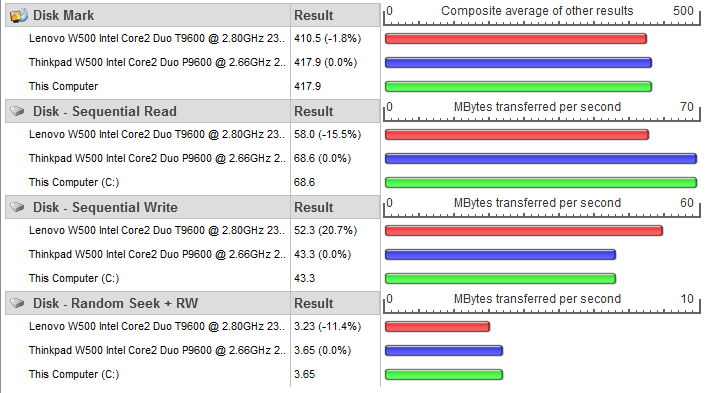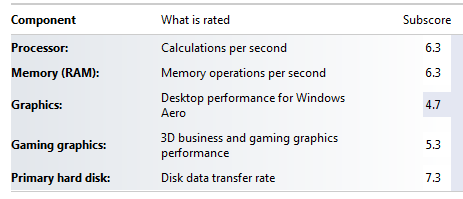Upgrading my Lenovo W500 to a OCZ Vertex 250GB SATA II Solid State Disk (SSD)
It's an old metaphor I've used for years, originally stealing it from comedian Larry Miller, but it's time to use it again, this time in reference to Hard Drives and SSDs.
The difference between an SSD and a regular Hard Drive is the difference between shooting a bullet and throwing it.
Sweet wondrous universe, it is. Remember that Lenovo W500 from last week? It's a great machine, truly. The best laptop I've ever had.
Here's my Lenovo W500's Windows Experience Index (WEI) under Win7 RC.
_3.png)
Note the 5.9 under Hard Disk. Here's that same machine using the PerformanceTest Disk Benchmark. My computer is the LAST one in each list, the green one, marked "This Computer." I've compared it with other people's results on the same Lenovo.

Looks like 68.6 megs/sec Seq. Read, 43 megs/sec Seq. WRite and 3.5 megs/sec Random Seek+RW.
Here's the same machine after I backed it up with my Windows Home Server, put in an OCZ Vertex 250GB Sata II Solid State Disk (SSD) and restored it.
Aside: Also available in sizes from 32 gig for $300 and up. The 256gig, while spendy, is the best deal. Others, however, prefer the 120gig for about $350 as the best price point.
The drive looks to your machine like an SATA II hard drive and it's already the same shape, so I just plugged it in and it was recognized as a Hard Drive. I didn't need to do anything special to get the computer to "recognize it."

Notice the 7.3 (out of 7.9 possible) in the WEI now. Here's the PerformanceTest results:
_3.png)
Now we see 110.8 megs/sec Seq. Read, 82 megs/sec Seq. WRite and 40.3 megs/sec Random Seek+RW. No physical parts to move around!
Joel Spolsky SWEARS by SSDs and told me it was the single most important upgrade one could do to take a machine to the next level. I hear he's bought new ones for his whole office. Expensive, a bit, yes, but it looks like my disk speed will be at least TWICE as fast, so you can do the math as to the number of minutes I'll save per day.
If you value your time at, say, $100 an hour, and you can save 10 min day total, that's $16. The $650 drive will pay for itself in about two work-months. It's worth your money, from what I can tell.
My Win7 laptop boots cold to password in 10 seconds now, enter password, then working desktop in 6 more seconds. Woot. I wish I had money to put an SSD on every machine. Here's hoping the prices go down.
About Scott
Scott Hanselman is a former professor, former Chief Architect in finance, now speaker, consultant, father, diabetic, and Microsoft employee. He is a failed stand-up comic, a cornrower, and a book author.
About Newsletter
And I'm with you on the prices going down part... I'd like an SSD but I maxed out my geek budget just buying a good PC without an SSD...
I'm with you on hoping the prices goes down.
I was originally interested in the Disc on Chip in pc's to increase the boot speed but this seems more practical to me. It will speed up the other programs loading as well. Imagine the load speed of Photoshop.
Which cache policy did you use for the ssd device? Its a bit of a cryptic text there.
Cheers
E
Microsoft and other Vendors have specified an extension to the original ATA protocol, which allows them to preemptivly erase blocks on disk, which are no longer used by the file system. AFAIK this extension is already supported by Windows 7, but I'm not sure which of the disk manufacturers also support it, especially because while there are many different manufacturers for SSDs, the controller chips that are in use are from the same few manufacturers and are often quite old.
It would be interesting to compare your results from now with the results in a few months. Of course you could also just fill the SSD with garbage once and see if you still get the same results, but I wouldn't recommend that ;-)
A couple of months ago, I grit my teeth and put down $800 for an Intel 160 X-25...but for whatever reason, defective drive or incompatible bios or something, it didn't work, so I returned it.
Tech spec-wise, the Intel is a better drive but I picked up the OCZ for $340 after rebate so the price was a little easier to stomach.
It's all about finding and removing the bottlenecks and the prices are definitely coming down. The Intel X-25 three months later is $650...
http://codebetter.com/blogs/patricksmacchia/archive/2008/12/04/solid-state-drive-enhance-developers-productivity.aspx
SSD is a must-have for every professional developer.
http://jeffreypalermo.com/blog/running-development-from-a-ram-disk-ndash-options-and-products/
BTW the 120 gig OCZ Vertex drive is faster then the larger OCZ Vertex drive. Also its very important you use the latest firmware as firmware updates have increased the speed and added functionality like support for the Trim function Windows 7 uses to keep SSDs running fast
Not as fast as an SSD, but still a big performance improvement AND 640GB of disk space. :-)
Would be interesting to hear what you / Jeff think about Readyboost & VelociRaptor combination vs. SSD on a desktop.
Agree that for a laptop there's no better way to go - SSD for the win! I recently added a Western Digital Scorpio Black to my Dell XPS laptop and it chews through the power - battery life just over an hour if I'm lucky
Is this not a REAL problem with the SSD? The SSD need TRIM If you don't want to loose performance over time. On a SSD with a VHD a delete of a file dosen't realy delete a block on the disc? What's your experience with this?
Comments are closed.

About 6 months ago I bought a 60GB for about $150 and the drive is now sitting at my desk cover with dust. For some reason my computer couldn't stop stuttering and the amount of tweaks I had to go through to get this thing at it's "best" potential is not worth the time. I think the problem was that I bought the "cheap" version. So based on my experience I would not recommend saving money on SSDs. At least at this moment.